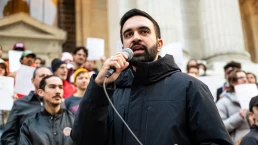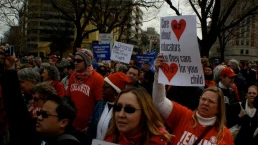Unlike apartheid-era South Africa, many universities aren’t even recognizing Israel’s human rights abuses.
by Stephen Zunes, The Progressive
A wave of sit-ins and encampments have swept college and university campuses across the country. They are being led—as in past anti-war campus protests in 1968—by Columbia University in New York. The immediate demand by most of these student groups is that their institutions divest from companies supporting Israel’s war and occupation. Calls for more ethical investment policies and an end to the bombardment of Gaza, however, are unthinkable for many university administrators and Washington officials, and the pushback has been intense.
Divestment campaigns have been fixtures on college campuses for generations—they’ve called for withdrawing financial support from arms manufacturers, owners of sweatshops, union busters, and carbon polluters, among other industries. What this wave of activism most resembles, however, are the protests of the late 1970s and the 1980s over investments in corporations doing business in apartheid South Africa. Back then, student encampments were designed as “shantytowns” to reflect the squalor in which Black South Africans lived amid the affluent white minority.

During the South Africa protests, arrests were mostly of students who engaged in more confrontational tactics, like occupying administration buildings, blocking traffic, or other actions meant to provoke arrest. The shantytowns and other encampments, with a few notable exceptions, were allowed to stay for weeks or even months. That’s not the case today, when many student camps have been subjected to mass arrests and removal almost immediately.
During the anti-apartheid struggle, student groups that organized shantytowns and other disruptive protests were allowed to operate as recognized student organizations. Now, at Columbia and elsewhere, chapters of Students for Justice in Palestine, Jewish Voice for Peace, and other anti-war/anti-occupation groups have been banned.
Recent Posts
Politicians Are Betraying Gen Z On Climate
July 10, 2025
Take Action Now While Gen-Zers thrift, knit, crochet, and find other ways to reduce our footprints, Trump and the GOP are greenlighting more climate…
Trump’s Deportation Threat Against Zohran Mamdani Is Shameful
July 10, 2025
Take Action Now In only half a year of Donald Trump’s presidency, he and his allies have turned deportation into an explicitly political threat…
Teachers Union Votes To Cut Ties To The Anti-Defamation League
July 10, 2025
Take Action Now In a momentous vote, the National Education Association voted to cut all ties with the Anti-Defamation League. The reason? “Despite…
2025 War Abolisher Awards Go To Albanese, Nader, Waters
July 9, 2025
Take Action Now The purpose of the awards is to honor and encourage support for those working to abolish the institution of war itself.By World…




